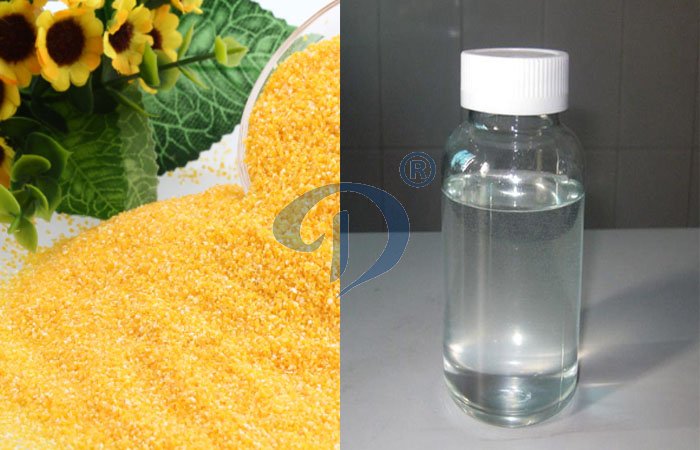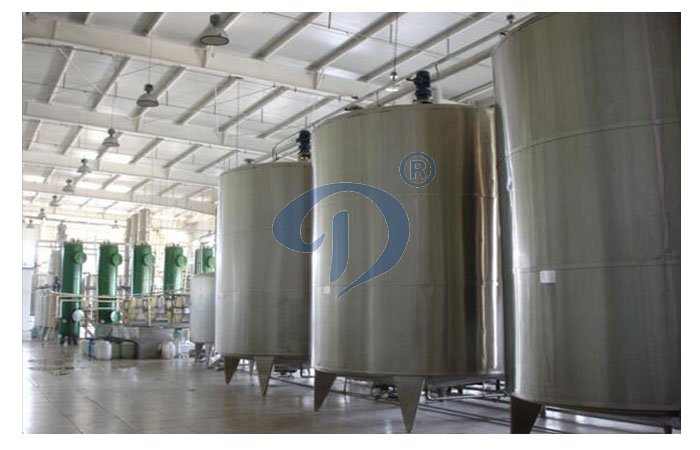 Tel/WhatsApp
Tel/WhatsApp
How corn syrup is made by corn syrup machine?
How corn syrup is made?
Corn syrup is produced in processing plants known as wet corn mills. In addition to corn syrup, these mills produce many other corn products including corn oil, corn starch, dextrose, soap stock, animal feed, and several chemicals used in other industrial processes.

Corn syrup
How corn syrup is made by the corn syrup machine?
1 Dried, shelled corn kernels are transported to the mill in trucks, railcars, or barges. The corn is unloaded into a storage pit where it is weighed and sampled.
2 The kernels are taken from the pit on conveyors and are passed over a set of vibrating screens or perforated metal grates to remove any sticks, husks, stones, and pieces of cob. A controlled blast of air blows away any chaff and dust, while electromagnets capture any nails, screws, or bits of metal that may have fallen in among the kernels during harvesting, shelling, or shipping.
3 The cleaned kernels are placed in a series of large stainless steel tanks called steep tanks. Each tank holds about 168,000 lb (76,000 kg) of kernels. Warm water with a small amount of sulfur dioxide is circulated through the tanks. The sulfur dioxide reacts with the water to form a weak sulfurous acid solution. This process continues for about 20-40 hours and is used to soften the kernels and make it easier to separate the starch.

A corner of corn syrup making machine in corn syrup making plant
4 The softened kernels are passed through coarse grinding mills to remove the inner portion of the kernel, called the germ, which contains most of the corn oil. Each mill has one stationary and one rotating disk. The clearance between the two disks is adjusted to tear the kernel apart without crushing the germ.
5 The resulting pulp is transferred to a set of cyclone separators called germ separators or hydroclones. The germs, which are less dense than the other parts of the kernel, are spun out of the pulp by centrifugal force. The germs are then pumped onto a series of screens and washed several times to remove any remaining starch. The cleaned germs are heated and pressed to extract the corn oil for further processing into food products and soap stock.
6 The remaining material from the germ separators is a slurry composed of starch, protein, and fiber. This slurry passes through another set of mills to tear the starch lose from the fiber. The fiber is then trapped on a set of washing screens and is dried to become animal feed or corn bran fiber for use in cereals.
7 The starch and protein mixture, called mill starch, is pumped into a set of centrifugal separators that spin the mixture at high speeds. Because of a difference in specific gravity between the two materials, the heavier starch can be separated from the lighter protein, which is called the gluten. The gluten is dried and sold as animal feed.
8 The starch is diluted with water before being washed and filtered 8-14 times to remove any remaining protein. It is then rediluted and run through a second set of centrifugal separators. The resulting starch is more than 99.5% pure. Some of this corn starch is dried and packaged for use in food products, building materials, or to produce various chemicals. The rest of it, usually the majority, is converted into corn sweeteners including corn syrup.

The corn syrup making machine
Converting corn starch into corn syrup by corn syrup machine:
9 Corn starch is converted into ordinary corn syrup through a process called acid hydrolysis. In this process, the wet starch is mixed with a weak solution of hydrochloric acid and is heated under pressure. The hydrochloric acid and heat break down the starch molecules and convert them into a sugar. The hydrolysis can be interrupted at different key points to produce corn syrups of varying sweetness. The longer the process is allowed to proceed, the sweeter the resulting syrup.
10 This syrup is then filtered or otherwise clarified to remove any objectionable flavor or color. It is further refined and evaporated to reduce the amount of water.
-
 Garri Processing vs. Cassava Starch Processing: Which is More Profitable and Easier to Start?
Garri Processing vs. Cassava Starch Processing: Which is More Profitable and Easier to Start?
-
 Investing in Cassava Starch Processing? Start with the Key Equipment for Success in Vietnam/Thailand Markets
Investing in Cassava Starch Processing? Start with the Key Equipment for Success in Vietnam/Thailand Markets
-
 The Potato Starch Processing Opportunity in 2025: Benefits and Challenges
The Potato Starch Processing Opportunity in 2025: Benefits and Challenges
-
 How to Choose Cassava Starch Processing Machine with Limited Capital to Cater for Both Farmers and Market?
How to Choose Cassava Starch Processing Machine with Limited Capital to Cater for Both Farmers and Market?
-
 Sustainable & Eco-Friendly Cassava Processing Solutions
Sustainable & Eco-Friendly Cassava Processing Solutions
-
 Solving 5 Common Challenges in Garri Processing with Modern Machinery
Solving 5 Common Challenges in Garri Processing with Modern Machinery
-
 Advantages of Cassava Starch Separating Machine - Centrifuge Sieve
Advantages of Cassava Starch Separating Machine - Centrifuge Sieve
-
 What is the capacity of cassava slicer manufactured by Henan Jinrui?
What is the capacity of cassava slicer manufactured by Henan Jinrui?
-
 How Much is the Cassava Agro Processing Machine Used for Cassava Flour Production?
How Much is the Cassava Agro Processing Machine Used for Cassava Flour Production?
-
 Which state in Nigeria produce the most cassava?
Which state in Nigeria produce the most cassava?
-
 Henan Jinrui delivers attieke processing equipment to the customer in Côte d'Ivoire
Henan Jinrui delivers attieke processing equipment to the customer in Côte d'Ivoire
-
 Henan Jinrui Successfully Ships Cassava Flour Processing Line to Madagascar Client
Henan Jinrui Successfully Ships Cassava Flour Processing Line to Madagascar Client
-
 Henan Jinrui Advanced Cassava Starch Processing Equipment Wins Over Nigerian Food Processor
Henan Jinrui Advanced Cassava Starch Processing Equipment Wins Over Nigerian Food Processor
-
 Henan Jinrui Delivers Custom 1TPD Garri & Attieke Making Equipment to Benin
Henan Jinrui Delivers Custom 1TPD Garri & Attieke Making Equipment to Benin
-
 Henan Jinrui Secures Order from Benin for 1-Ton Daily Garri and Attieke Processing Machines
Henan Jinrui Secures Order from Benin for 1-Ton Daily Garri and Attieke Processing Machines
CONTACT US
DOING company offers cassava processing machine from single machine to the complete production line. If you want to get more details about cassava processing machine, please contact us:
- Do you want to buy machine?
- Yes, I want to buy machine
- No, I want to learn more in advance.
- What is your raw material?
- Cassava
- Potato
- Sweet potato
- Others
- 2. What is the final product you want to produce?
- Garri
- Cassava flour
- Cassava starch
- Cassava chips
- Attiekie
- Bammy
- Others
- 3.What is your capacity plan?
- Small scale garri machine
- 1ton per day
- 2tons per day
- 3tons per day
- 10tons per day
- 20tons per day
- Others
- 3.What is your capacity plan?
- Small scale
- 5tons per day
- 10tons per day
- 20tons per day
- 50tons per day
- 100tons per day
- Others
- 3.What is your capacity plan?
- Small scale
- 5tons per day
- 10tons per day
- 20tons per day
- 50tons per day
- 100tons per day
- 200tons per day
- 300tons per day
- Others
- 3.What is your capacity plan?
- Small scale
- Middle type
- Large scale
- What is your capacity plan?
- Small scale
- 5tons per day
- 10tons per day
- 20tons per day
- 50tons per day
- 100tons per day
- 200tons per day
- 300tons per day
- Others








